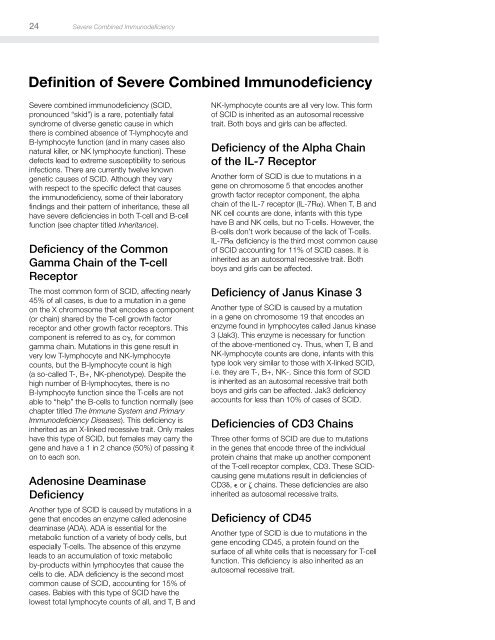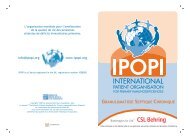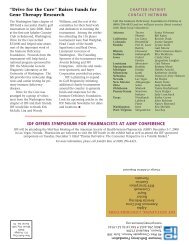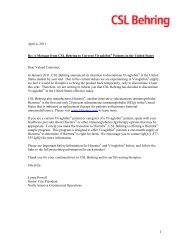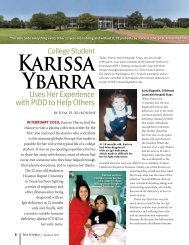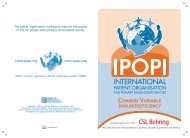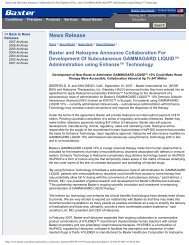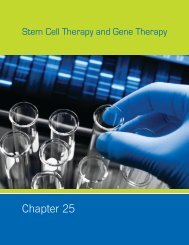IDF Patient & Family Handbook for Primary Immunodeficiency ... - IDFA
IDF Patient & Family Handbook for Primary Immunodeficiency ... - IDFA
IDF Patient & Family Handbook for Primary Immunodeficiency ... - IDFA
You also want an ePaper? Increase the reach of your titles
YUMPU automatically turns print PDFs into web optimized ePapers that Google loves.
24<br />
Severe Combined <strong>Immunodeficiency</strong><br />
Definition of Severe Combined <strong>Immunodeficiency</strong><br />
Severe combined immunodeficiency (SCID,<br />
pronounced “skid”) is a rare, potentially fatal<br />
syndrome of diverse genetic cause in which<br />
there is combined absence of T-lymphocyte and<br />
B-lymphocyte function (and in many cases also<br />
natural killer, or NK lymphocyte function). These<br />
defects lead to extreme susceptibility to serious<br />
infections. There are currently twelve known<br />
genetic causes of SCID. Although they vary<br />
with respect to the specific defect that causes<br />
the immunodeficiency, some of their laboratory<br />
findings and their pattern of inheritance, these all<br />
have severe deficiencies in both T-cell and B-cell<br />
function (see chapter titled Inheritance).<br />
Deficiency of the Common<br />
Gamma Chain of the T-cell<br />
Receptor<br />
The most common <strong>for</strong>m of SCID, affecting nearly<br />
45% of all cases, is due to a mutation in a gene<br />
on the X chromosome that encodes a component<br />
(or chain) shared by the T-cell growth factor<br />
receptor and other growth factor receptors. This<br />
component is referred to as cg, <strong>for</strong> common<br />
gamma chain. Mutations in this gene result in<br />
very low T-lymphocyte and NK-lymphocyte<br />
counts, but the B-lymphocyte count is high<br />
(a so-called T-, B+, NK-phenotype). Despite the<br />
high number of B-lymphocytes, there is no<br />
B-lymphocyte function since the T-cells are not<br />
able to “help” the B-cells to function normally (see<br />
chapter titled The Immune System and <strong>Primary</strong><br />
<strong>Immunodeficiency</strong> Diseases). This deficiency is<br />
inherited as an X-linked recessive trait. Only males<br />
have this type of SCID, but females may carry the<br />
gene and have a 1 in 2 chance (50%) of passing it<br />
on to each son.<br />
Adenosine Deaminase<br />
Deficiency<br />
Another type of SCID is caused by mutations in a<br />
gene that encodes an enzyme called adenosine<br />
deaminase (ADA). ADA is essential <strong>for</strong> the<br />
metabolic function of a variety of body cells, but<br />
especially T-cells. The absence of this enzyme<br />
leads to an accumulation of toxic metabolic<br />
by-products within lymphocytes that cause the<br />
cells to die. ADA deficiency is the second most<br />
common cause of SCID, accounting <strong>for</strong> 15% of<br />
cases. Babies with this type of SCID have the<br />
lowest total lymphocyte counts of all, and T, B and<br />
NK-lymphocyte counts are all very low. This <strong>for</strong>m<br />
of SCID is inherited as an autosomal recessive<br />
trait. Both boys and girls can be affected.<br />
Deficiency of the Alpha Chain<br />
of the IL-7 Receptor<br />
Another <strong>for</strong>m of SCID is due to mutations in a<br />
gene on chromosome 5 that encodes another<br />
growth factor receptor component, the alpha<br />
chain of the IL-7 receptor (IL-7Ra). When T, B and<br />
NK cell counts are done, infants with this type<br />
have B and NK cells, but no T-cells. However, the<br />
B-cells don’t work because of the lack of T-cells.<br />
IL-7Ra deficiency is the third most common cause<br />
of SCID accounting <strong>for</strong> 11% of SCID cases. It is<br />
inherited as an autosomal recessive trait. Both<br />
boys and girls can be affected.<br />
Deficiency of Janus Kinase 3<br />
Another type of SCID is caused by a mutation<br />
in a gene on chromosome 19 that encodes an<br />
enzyme found in lymphocytes called Janus kinase<br />
3 (Jak3). This enzyme is necessary <strong>for</strong> function<br />
of the above-mentioned cg. Thus, when T, B and<br />
NK-lymphocyte counts are done, infants with this<br />
type look very similar to those with X-linked SCID,<br />
i.e. they are T-, B+, NK-. Since this <strong>for</strong>m of SCID<br />
is inherited as an autosomal recessive trait both<br />
boys and girls can be affected. Jak3 deficiency<br />
accounts <strong>for</strong> less than 10% of cases of SCID.<br />
Deficiencies of CD3 Chains<br />
Three other <strong>for</strong>ms of SCID are due to mutations<br />
in the genes that encode three of the individual<br />
protein chains that make up another component<br />
of the T-cell receptor complex, CD3. These SCIDcausing<br />
gene mutations result in deficiencies of<br />
CD3d, e or z chains. These deficiencies are also<br />
inherited as autosomal recessive traits.<br />
Deficiency of CD45<br />
Another type of SCID is due to mutations in the<br />
gene encoding CD45, a protein found on the<br />
surface of all white cells that is necessary <strong>for</strong> T-cell<br />
function. This deficiency is also inherited as an<br />
autosomal recessive trait.


